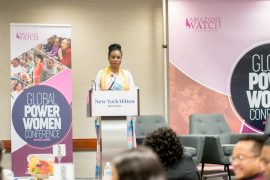Mrs. Felicia Twumasi is the CEO of Homefoods Processing and Cannery Limited, a high-scale ethnic food processing and packaging company, with 70% market share in the Red Oil business and a distribution network across The United Kingdom, Italy, Switzerland, North America and West Africa. In this sequel interview with the Amazon Watch magazine, Mrs. Twumasi discussed her expansionary drive and the impact of hercompany in the lives of women and children in Ghana. Excerpt:
In your previous interview with the Amazons Watch magazine in February 2018, you were quoted to have said that Homefoods has Kept 70% market share in the Red Oil business for 14 years and counting on your customized brands such as BLUE BAY, TROPIGOLD, AFRICA’S FINEST, GHANA BEST, YADCO, BIGGIE MAMA, HOMEFOODS AND HOMESENSE, with a current distribution network including; The United Kingdom, Italy, Switzerland, North America, West Africa and future projections into East and Southern African markets. Please tell us how you have been able to achieve this feat and what differentiates your brand from the others?
My vision has always been to create, build and establish a quality food chain industry by fusing flavors and spices from around the world, to meet the needs of our consumers with a mission to focus attention and creativity on basic food ingredients and services to all and sundry, homes, catering, hotels and fast food industries; food ingredients and products they absolutely need and want, thus making every meal an experience. These have been achieved through adaptive production, effective inventory management and renewed product designs while creating value and wealth for our nation through agriculture in order to maintain a sustainable legacy for posterity. The consistency, high standards, quality and speed to markets have been our hallmark to achieve this feat. These have resulted in setting high standards in our business relationships leading to forming partnerships with customers globally and locally, and are evident in several local and international awards. This strategy and business model differentiates us from our competitors locally and internationally.
Homefoods Processing and Cannery Limited have been able to build and sustain the company for the past 23 years in highly competitive and discrete and identifiable markets by configuring multi markets activities based on our experience with such great success. We continuously expand our distribution networks through constant rejuvenation of our key quality products; non-perishable rich red oil processed from fruits of the palm; diversified into new product ranges, such as Palm Cream Soup and other edible innovative derivatives of palm to meet international as well as local standards.
We have been able to maintain consistent taste and quality throughout these 23 years in Agro Processing business. Specifications of our products are all standardized and certified, hence the loyalty of consumers and recognition abroad through multiple awards.
You have also said your passion has been to engage and train women out-growers and to empower them to capably give better care to their families. You also have been quoted to have said that Homefoods thrives on her corporate social responsibility, among others. Please tell us more about your cooperative system for women farmers and some of your accomplishments in giving back to the society?
The drive and aim to leave a sustainable legacy in food production and processing in my country and to alleviate poverty for especially women farmers led us to a cooperative model for our supply chain have we term as “SUBSET Cooperative” system.
Our cooperative system that started with 5 women has grown into more than 5,000 women over the years across the farming belt of the country. The subset system help us group them in 100’s having 50 groups and they choosing their leaders to be trained by us and subsequent also practically train the larger group using the Ministry of Agriculture extension officers at various farming area for the training and supervision.
Yields have increased resulting in creating massive wealth in terms of when we started 23 years ago when the annual turnover of a farmer was nothing to note. The wealth creation to these cooperative farming groups has remotely resulted in massive corporate social responsibility. Ready markets provided to these farmers have led to improving of nutrition, health, education production and creating confidence, stability and sustenance in a fragile community before we went in to start business. This socio-economic empowerment has resulted in their self-confidence, self-dignity, and increasing life expectancy. My overall joy is seeing these women exhuming happiness.
We also sponsor loads of social activities in these societies
In accordance with our ‘Giving Back Policy”,
- We educate the children of some of these women farmers who are mainly single mothers.
- We have provided financial support to street children by creating scholarship schemes that enable needy children to attend various schools, and as a result of our social intervention these children have come back to work for the company in various capacities.
- As a condition for our suppliers, Homefoods admonishes its suppliers not to use child labor. Homefoods will unequivocally not purchase supplies from any agro group that resorts to the use of child labor.
- The company has also embarked on a concerted effort to employ single women heading households as factory workers and as well as young girls. This has empowered these women to assume responsibilities, which they would otherwise not be capable of as they are paid above the minimum wage.
- Working to instill the same courage and ambition in her fellow Ghanaians, she empowers local female farmers by teaching them the business savvy methods that have led to her many successes.
- I fervently work to instill the same courage and ambition I have used to manage Homefoods in her fellow Ghanaians. I endeavor to coach leadership skills by empowering local female farmers.
Yesterday, October 16th, was marked as World Food Day. The World Health Organization, WHO, African region disclosed that hunger, is on the rise in Africa after a prolonged decline as nearly 14 million under-fives are wasted, 59 million are stunted due to under nutrition. As a key stakeholder in the food sector in Africa, what are your thoughts on hunger and food security in Africa?
The World Food Day as we all know is celebrated yearly on the 16th October, by over 150 member countries of the UN. It was established in November 1979 at the 20th General Conference by the Food and Agriculture Organization, a branch of the World Health Organization to raise awareness on issues pertaining to poverty and hunger, a prevalent problem in Africa in spite of the abundance of natural resources on the continent. In brief, not only are the14 million under-fives being wasted and 59 million, stunted due to under nutrition but in effect the parents of these precious ones themselves are incapable of meeting the basic needs for themselves much less of their families. The World Health Organization throws more light on the fact that a surge in population, has contributed to the increase in poor people and causing poverty and its associated challenges to remain.
As an African, I can confidently say that political and ethnic conflicts and unorthodox means of changing Governments have contributed to the menace as the focus then shifts from the developmental needs of the people. This situation causes unstable economy/markets, increases inflation and the cost of living of the people. The obvious detriment is that the wealth of the continent would lay stagnant and unexploited, as there would be lack of investments, especially in the Agricultural Sector that is so freely given.
In my view, the aim would be to focus on the factors that mitigate against poverty by our governments by empowering private sector agro business with long term financial facilities to build and establish food and formulation plants around the country to mitigate hunger.
Homefoods main focus is to eliminate poverty, enhance the value of food and help women become financially independent, not only for themselves but also for their families and in the long run, their communities through the cooperative system that we have created.
We have future plans to develop storage and formulation capacity of 50,000 metric tons facilities for grains, legumes, edible oils, nuts creating a food corridor for all and sundry ensuring food security for our nation and other countries.
I personally go by the principle where poverty is not an option, as I reiterated in my previous interview with you in February. This has been one of my driving forces through this journey. We have made frantic efforts not only for myself and for my family but many other families nationally and globally.
I believe that with joint efforts from stakeholders to create jobs, investing in the developments of agriculture and the resources in our continent, partnerships with Foreign Bodies and through Corporate Social Responsibility to our communities, poverty and hunger will once again decline.
Research has shown that food insecurity problem is fundamentally influenced by subsistent production, which in turn is usually characterized by low and declining production and productivity, and the employment of rudimentary technology. Homefoods core business is linked to improving Nutrition, Health, Agriculture and Productivity in Ghana. Kindly tell us how you are able to enhance productivity.
Homefoods Processing and Cannery Limited started from the subsistence enterprise on the kitchen table, which we have nurtured into an internationally recognized agro-processing entity. Homefoods has had steady growth of 203% local revenue between 2016 and 2018 as well as, 44% growth in export. This has been possible as a well-focused and conscious effort was put into the drift from rudimentary technology of operations to a double clean filling technology. Going forward, Homefoods will be operating with fully automated clean filling lines. We envisage to increase productivity by 400% in 2020. These achievements have not only been by the adoption of technology but also, the rapid strategic customer based product development and branding, highly reliable and dependable raw material suppliers source transparent value chain, fair pricing and concern for the environmental, social and cultural values have been a catalyst for enhanced productivity managed by highly skilled and professional human capital, and a high demand of our product lines.
You have been recently endorsed by the Board of the Centre for Economic and Leadership Development (CELD) to be conferred with the Medal of Honor as a Honorary Patron of her flagship event- the South America-Africa-Middle East-Asia Women Summit (SAMEAWS)- and inducted into her International Advisory Council as a Distinguished Member. How do you feel receiving such an honor and recognition?
It is an honor for our company and myself to be endorsed by CELD once again. This time, to be conferred with the Medal of Honor as an Honorary Patron for her flagship event by His Royal Highness Sheik Juma bin Maktoum – the South America-Africa-Middle East-Asia Women Summit (SAMEAWS) and inducted into the International Advisory Council as a Distinguished Member to empower women as powerful agents of change. This is an inspiration for Homefoods Processing and Cannery Limited. Not to mention the Georgia Congressional Commendation in recognition of my personality as a face of Ghana’s business integrity and passion for development. This has really been breathe-taking and overwhelming for us all.
We believe that this mutual partnership shall continue to serve as a platform for our company’s global recognition as we continue to penetrate into other sub-regions through the feature on the Amazon’s Watch Magazine and its sister publication, the frontline Africa Leadership Magazine.
I look forward to networking with the over 1000 prominent women and stakeholders from the various regions under the SAMEAWS to gain knowledge from each other and confer ways to access untapped potential for women around the world. I believe the theme for this year is appropriate, “Realizing Legislation and Policies on Gender and Sustainability” as UN has declared the 7 Sustainable goals;
-No Poverty
-Zero Hunger
-Good Health and Well Being
-Quality Education
-Clean water and sanitation
-Affordable and Clean Energy
-Decent Work and Economic Growth
Homefoods is playing a crucial role in our agro business supply chain within these UN Sustainable goals as we create wealth for thousands of women who have developed confidence and self-dignity as they become economically independent enabling them to provide balanced Nutrition, Health, Quality Education, Clean Water, affordable energy.
We are emotionally and physically satisfied that our business have impacted lives which have spill over on our socio-economic and geographical lifestyles. We are poised to offer help to up and coming women advancing into businesses sphere to overcome many of the obstacles some of us experienced on our business journey.
I take this opportunity to express my appreciation for the African Impact Leadership Award (Agricultural Development Category) and for being showcased as one of Amazons Watch Magazine Blue Ribbon List of Top 50 Women in Business and Governance, which was the cover focus of the Magazine’s special exclusive in the March 2018 edition. We are certain this spotlight on Homefoods Processing and Cannery will open key doors that will enhance and sustain our business as a global entity.
Thank you and this award goes to all women!!!!




